Germany has a reputation as one of Europe’s most expensive countries, so it may surprise you to learn that a vacation in that fascinating land can be quite affordable.
In fact, it’s even possible to travel through Germany on the cheap once you get there. Even though it’s a large country, about half the size of Texas, it’s one of the easiest places in the world to get around in.
Trains and buses go almost everywhere, and you can also choose to rent a car and drive. Whether you’re visiting the major cities, the Neuschwanstein Castle, the Black Forest or the Rhine and Mosel valleys, you’ll find the major attractions of Germany accessible, and you don’t have to spend a fortune to enjoy them.
But before you don your lederhosen and lift a stein in a German bar, let’s take a more detailed look at what your German vacation might cost. Let us be your guide!
Average Trip to Germany Cost in 2025
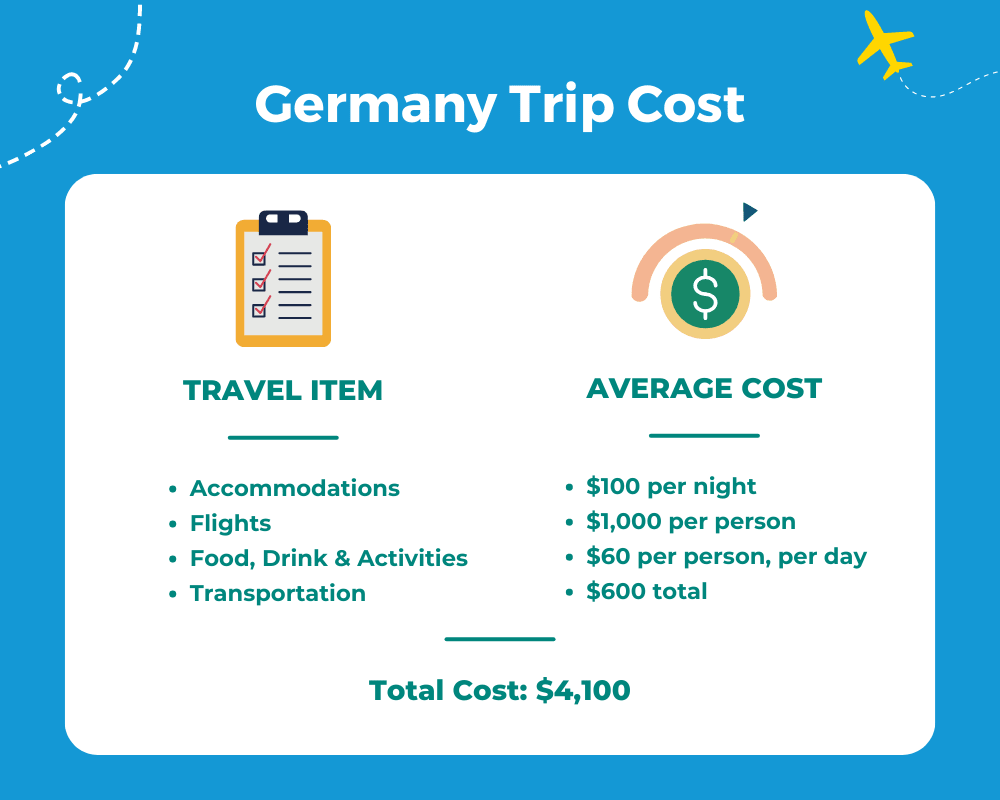
A week in Germany for two people, living comfortably and seeing a lot of the sites, will cost roughly $4,100.
- Average Accommodation Cost: $100 per night
- Average Flight Cost: $1,000 per person
- Food, Drink & Activities: $60 per person per day
- Transportation: $600
- Total Cost: $4,100
Costs for everything from flights to hotels to that stein of beer are higher during the summer and during special times such as Oktoberfest. If a visit to the world-renowned fall festival is your lifelong dream, you’ll have to plan on spending a bit more.
However, there’s plenty to see and do all year round, and the seven-day vacation that can be had at these prices is unlikely to disappoint.
The good news: if you book outside of peak season, stay in nice but not fancy motels (or even hostels!), eat only a few of your meals in restaurants and avoid the most costly tours, you can shave as much as a couple thousand off that number.
Ready to Book?
Unlock Exclusive Discounts on Expedia.com!
Got Travel Insurance?
Protect yourself for unexpected interruptions.
Compare Plans We may be compensated when you book after clicking on one of our links.Germany Trip Cost: Average by Item
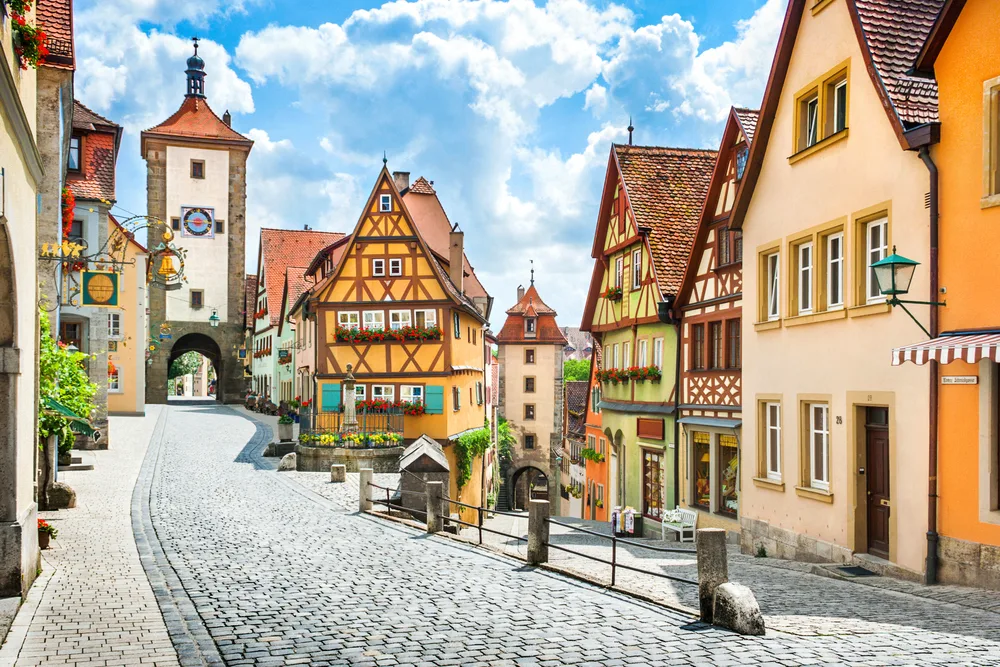
Canadastock/Shutterstock
Accommodation Costs
Based on a recent survey of almost 20,000 German hotels, the average nightly cost was $95 and the median price was $89, not including taxes and fees.
The average price for budget hotels was $67, and even luxury hotels averaged only $149. All and all, accommodation prices aren’t out of line with North American and other European destinations.
Some hotels offer a substantial German breakfast as part of the deal. Rates at these locations may run a few dollars higher. For those who want to save a little more money and don’t mind a less formal accommodation, there are hostels.
Budget-minded travelers report basic dorm beds for about $25 per night and top-flight hostels for a little over $50.
Most hotels can be booked well in advance, which is a smart idea, especially if you’re looking for the best accommodation available in your price range.
Flight Costs
According to Skyscanner, flight costs from the U.S. vary widely depending on the season. During the peak summer months and during Oktoberfest, you’ll be hard-pressed to find anything under $1,000 per person, and tickets can cost $1,800 and more.
If you’re more flexible about when you travel, you might find November tickets in the $500-$700 range. When you’re checking ticket prices, it pays to look at more than one city as your arrival point.
Often Frankfurt or Cologne will be cheaper than Berlin. If you’re not tied down to an exact date, you may save by specifying a range of dates in your search.
Food, Drink & Activity Costs
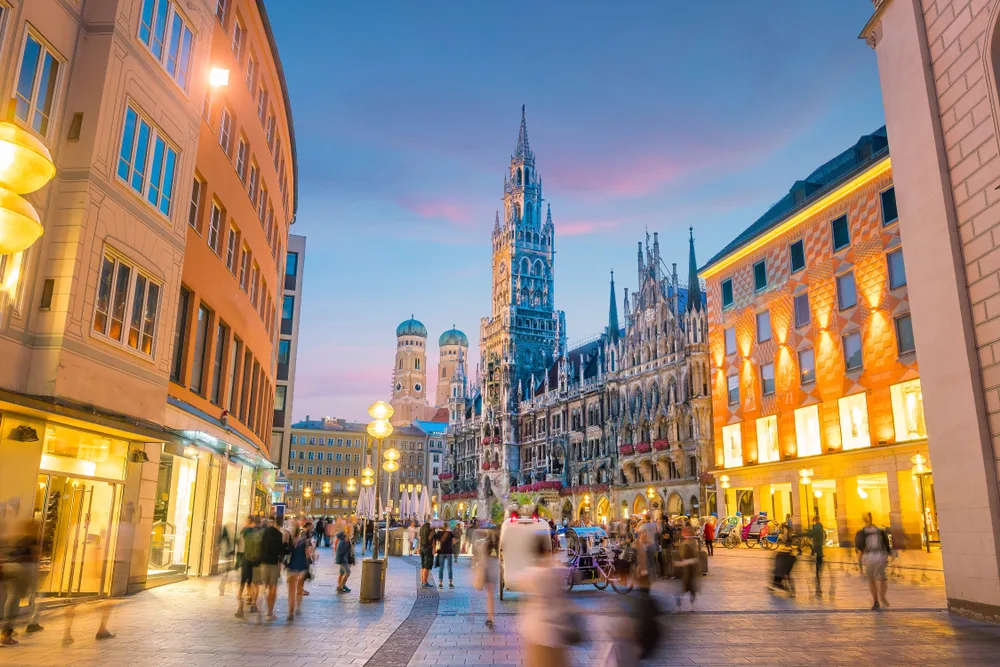
f11photo/Shutterstock
There’s plenty of good food to eat in Germany, and you don’t have to spend a fortune to enjoy it. If you dine in the finest restaurants, you could easily spend $100 or more per plate, but you can have your fill of national favorites for around $50 for an entire day’s worth of restaurant food.
Recent travelers have reported lunches around $15 and dinners in the $20-$25 range. If you choose not to sit and be served, you can nab a sausage sandwich for only a few dollars.
Some German favorites include bratwurst with sauerkraut, currywurst (bratwurst served with curry sauce), schnitzel and eisbein (pork leg).
There’s also flammkuchen, a yeastless German pizza with a crust that doesn’t rise, and Kasespatzle, a type of noodle generously doused with cheese, which is the national version of spaghetti.
Expectations about tipping are less than precise, but it’s appropriate to tip around 15 percent for good service.
You can see a lot in Germany just walking around and checking out the sites, but it’s worth spending the reasonable admission fees for such attractions as the Neuschwanstein Castle, Lake Konigssee and the Eagle’s Nest.
There are also city walking tours, Rhine cruises and day trips to the castles. Admissions are generally reasonable, starting around $20, and longer guided tours might be in the $50-$100 range. Many of the cities offer free museums and art galleries.
Transportation Costs
Germany is one of the easiest countries in the world to get around. trains and buses go just about everywhere. If you’re spending most of your time in major cities and famous attractions, there are plenty of public transportation options.
Every town that’s big enough to need public transportation has it. If you visit small communities, or if you want to get of the beaten path and explore the countryside on your own, you can always rent a car.
According to Kayak, rental cars average about $300 per week. Gas is expensive, at an equivalent of over $6 per gallon.
In major cities, you can buy a 24-hour pass good for all local transportation options – buses, trains and trams – for about $10-$15. Bicycling is a popular and practical option, with one-days rentals at around $12-$25.
Train rides between cities such as Munich, Berlin, Frankfort and Cologne can be purchased for about $40-$80.
Things to Consider
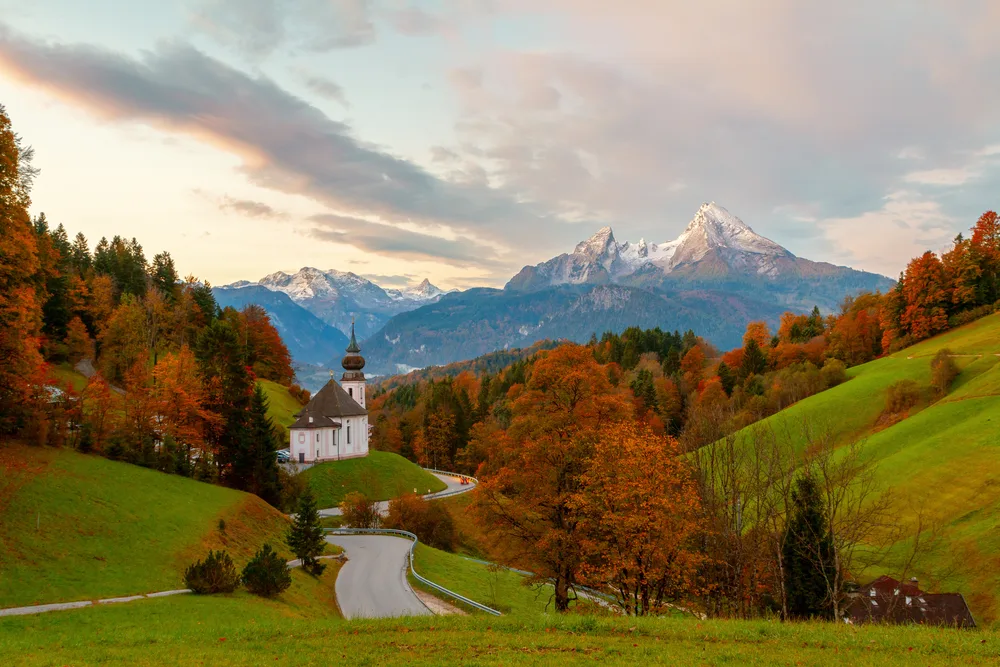
Here are a few things you should be aware of before you pack for your trip:
- Weather is unpredictable. Dress in layers, and have a jacket or sweater handy even on mild days. Also, carry an umbrella or rain gear. Rain is common and catches the unwary by surprise.
- It’s customary to greet people in shops before you talk business, or even if you conduct no business at all. Depending on the time of day, a “Guten Morgen,” “Guten Tag” or “Guten Abend” is always appreciated. A greeting in English will also serve. And don’t forget to say “Auf Wiedersehen” when you leave.
- Credit cards are not universally accepted. That’s a little surprising for such a high-tech country, but even shops in transit hubs may insist on cash.
- You might want to carry some coins as well as bills, since public restrooms are seldom free, even in bus stations and shopping malls.
- Like most Europeans, Germans rest on Sundays. In much of the country, even supermarkets will be closed. Many restaurants, however, will be open.
- German punctuality is no myth. Trains and buses leave on time, so be there a few minutes early. If you make an appointment to meet a German, they’ll be on time (or early) and won’t appreciate it if you’re late.
- Water is seldom free. You have to pay for it in restaurants, and, unless you specify otherwise, it’s likely to be carbonated water.
- Germans seldom speak loudly in public. If you do so, especially in English, Germans are likely to stare at you.
- Germans don’t jaywalk. You’ll get some pointed stares and maybe even a negative comment if you do it.
Frequently Asked Questions
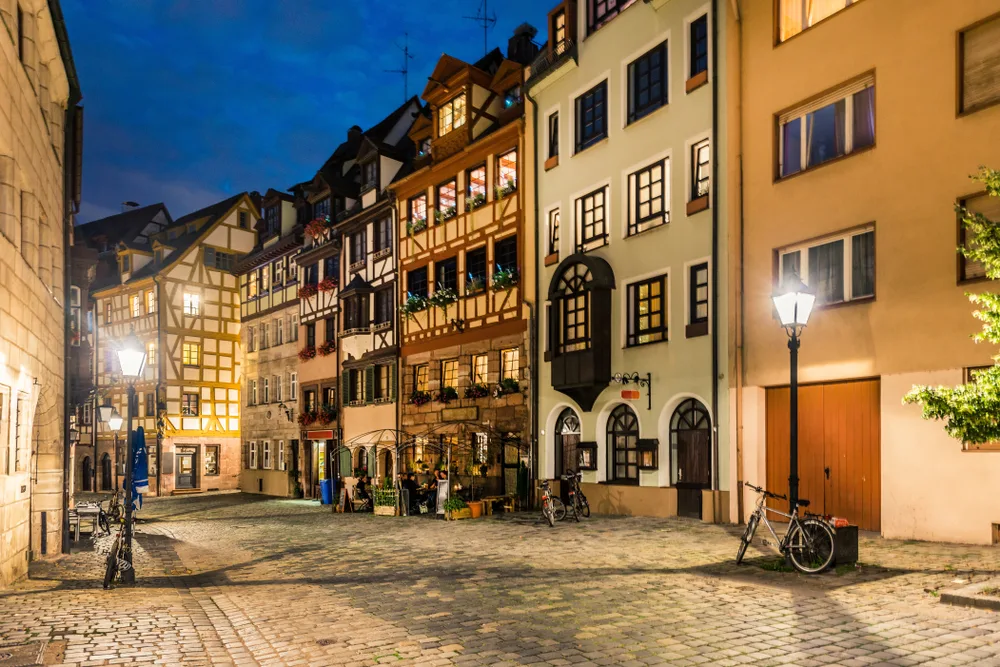
Dmitry Zinovyev/Shutterstock
Is English commonly spoken in Germany?
Yes. There will almost always be English speakers in major cities and other areas frequented by tourists. If the person you’re addressing doesn’t speak English, there’s usually someone nearby that does. You’ll often find restaurant menus written in both German and English.
What are the cheapest months to travel to Germany?
The least expensive months are January through March, although you’ll have to contend with cold weather and early sunsets. Weather is nicer and costs are still lower in late spring, March to May, and in the fall after Oktoberfest has passed.
Is Germany friendly to tourists?
There’s a stereotype that Germans are cold and standoffish, but it’s not really the case. They’re helpful and kind. However, you may have to initiate the conversation and ask for help.
Is Germany safe?
Crime rates are low, even in major cities, though you may have to be aware of pickpockets in areas where tourists congregate. With the public infrastructure and transportation, Germany is safe and convenient for solo travelers, including lone women.
How many days do you need in Germany?
A lot of people will say that two weeks are ideal, but you can have a great experience with just one, although you need to recognize that you won’t see everything. If you’re going to be in the country for just seven days, you might center your stay around one or two regions and make day trips if you want to see a little more.
How easy is it for an American to drive in Germany?
Not hard at all. German traffic drives on the right, so there isn’t the mental switch Americans have to make in countries such as the U.K. An American driver’s license is valid in Germany.
So, What Is the Average Cost for a Germany Trip?
| 🛎️ Average Accommodation Cost | $100 per night |
| ✈️ Average Flight Cost | $1,000 per person |
| 🍽️ Food, Drink & Activities | $60 per person, per day |
| 🚕 Transportation | $600 total |
| 💲 Total Cost | $4,100 |
While some folks might find that to be a daunting number, the traveler who is flexible about travel dates, who plans ahead and who watches expenses might be able to cut that figure in half or more.
So much that’s great about Germany is free: the amazing Gothic architecture, the rolling countryside, the welcoming friendliness of the locals.
Many of the top attractions are free or reasonably priced, and food and accommodation can cost just about as much or as little as you want them to. If a trip to Germany has always been one of your dreams, now is a great time to go ahead and start planning. Happy travels!






